Related Research Articles
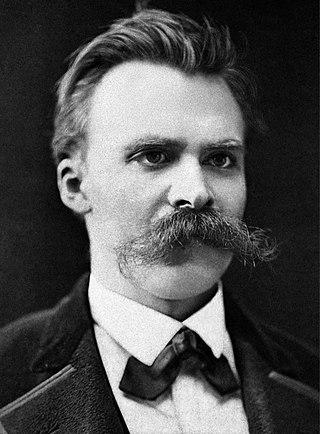
Friedrich Wilhelm Nietzsche was a German classical scholar, philosopher, and critic of culture, who became one of the most influential of all modern thinkers. He began his career as a classical philologist before turning to philosophy. He became the youngest person to hold the Chair of Classical Philology at the University of Basel in 1869 at the age of 24, but resigned in 1879 due to health problems that plagued him most of his life; he completed much of his core writing in the following decade. In 1889, at age 44, he suffered a collapse and afterward a complete loss of his mental faculties, with paralysis and probably vascular dementia. He lived his remaining years in the care of his mother until her death in 1897 and then with his sister Elisabeth Förster-Nietzsche. Nietzsche died in 1900, after experiencing pneumonia and multiple strokes.
Nihilism is a family of views within philosophy that rejects generally accepted or fundamental aspects of human existence, such as knowledge, morality, or meaning. The term was popularized by Ivan Turgenev and more specifically by his character Bazarov in the novel Fathers and Sons.

Johann Kaspar Schmidt, known professionally as Max Stirner, was a German post-Hegelian philosopher, dealing mainly with the Hegelian notion of social alienation and self-consciousness. Stirner is often seen as one of the forerunners of nihilism, existentialism, psychoanalytic theory, postmodernism and individualist anarchism.
The Übermensch is a concept in the philosophy of Friedrich Nietzsche. In his 1883 book, Thus Spoke Zarathustra, Nietzsche has his character Zarathustra posit the Übermensch as a goal for humanity to set for itself. The Übermensch represents a shift from otherworldly Christian values and manifests the grounded human ideal. The Übermensch is someone who has "crossed over" the bridge, from the comfortable "house on the lake" to the mountains of unrest and solitude.

A duty is a commitment or expectation to perform some action in general or if certain circumstances arise. A duty may arise from a system of ethics or morality, especially in an honor culture. Many duties are created by law, sometimes including a codified punishment or liability for non-performance. Performing one's duty may require some sacrifice of self-interest.

The Birth of Tragedy Out of the Spirit of Music is an 1872 work of dramatic theory by the German philosopher Friedrich Nietzsche. It was reissued in 1886 as The Birth of Tragedy, Or: Hellenism and Pessimism. The later edition contained a prefatory essay, "An Attempt at Self-Criticism", wherein Nietzsche commented on this earlier book.

Beyond Good and Evil: Prelude to a Philosophy of the Future is a book by philosopher Friedrich Nietzsche that covers ideas in his previous work Thus Spoke Zarathustra but with a more polemical approach. It was first published in 1886 under the publishing house C. G. Naumann of Leipzig at the author's own expense and first translated into English by Helen Zimmern, who was two years younger than Nietzsche and knew the author.
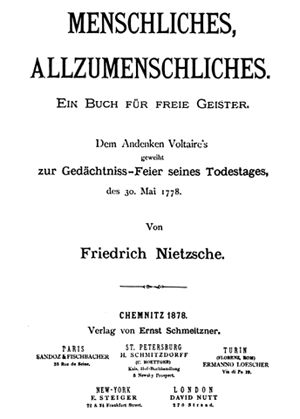
Human, All Too Human: A Book for Free Spirits is a book by 19th-century philosopher Friedrich Nietzsche, originally published in 1878. A second part, Assorted Opinions and Maxims, was published in 1879, and a third part, The Wanderer and his Shadow, followed in 1880.

Walter Arnold Kaufmann was a German-American philosopher, translator, and poet. A prolific author, he wrote extensively on a broad range of subjects, such as authenticity and death, moral philosophy and existentialism, theism and atheism, Christianity and Judaism, as well as philosophy and literature. He served more than 30 years as a professor at Princeton University.
The last man is a term used by the philosopher Friedrich Nietzsche in Thus Spoke Zarathustra to describe the antithesis of his theorized superior being, the Übermensch, whose imminent appearance is heralded by Zarathustra. The last man is the archetypal passive nihilist. He is tired of life, takes no risks, and seeks only comfort and security. Therefore, the last man is unable to build and act upon a self-actualized ethos.
Master–slave morality is a central theme of Friedrich Nietzsche's works, particularly in the first essay of his book On the Genealogy of Morality.

The Apollonian and the Dionysian are philosophical and literary concepts represented by a duality between the figures of Apollo and Dionysus from Greek mythology. Its popularization is widely attributed to the work The Birth of Tragedy by Friedrich Nietzsche, though the terms had already been in use prior to this, such as in the writings of poet Friedrich Hölderlin, historian Johann Joachim Winckelmann, and others. The word Dionysian occurs as early as 1608 in Edward Topsell's zoological treatise The History of Serpents. The concept has since been widely invoked and discussed within Western philosophy and literature.

Friedrich Nietzsche (1844–1900) developed his philosophy during the late 19th century. He owed the awakening of his philosophical interest to reading Arthur Schopenhauer's Die Welt als Wille und Vorstellung and said that Schopenhauer was one of the few thinkers that he respected, dedicating to him his essay Schopenhauer als Erzieher, published in 1874 as one of his Untimely Meditations.
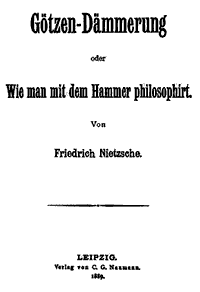
Twilight of the Idols, or, How to Philosophize with a Hammer is a book by Friedrich Nietzsche, written in 1888, and published in 1889.
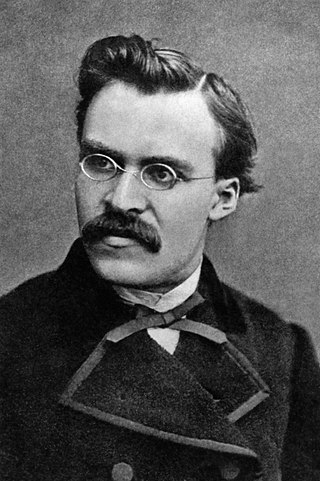
Friedrich Nietzsche's influence and reception varied widely and may be roughly divided into various chronological periods. Reactions were anything but uniform, and proponents of various ideologies attempted to appropriate his work quite early.
Richard Schacht is an American philosopher and professor emeritus at the University of Illinois Urbana-Champaign now residing in Santa Fe, New Mexico.
Egoist anarchism or anarcho-egoism, often shortened as simply egoism, is a school of anarchist thought that originated in the philosophy of Max Stirner, a 19th-century philosopher whose "name appears with familiar regularity in historically orientated surveys of anarchist thought as one of the earliest and best known exponents of individualist anarchism". Egoist anarchism places the individual at the forefront, crafting ethical standards and actions based on this premise. It advocates personal liberation and rejects subordination, emphasizing the absolute priority of self-interest.
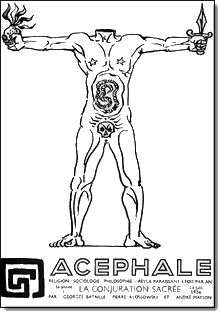
Acéphale is the name of a public review created by Georges Bataille and a secret society formed by Bataille and others who had sworn to keep silent. Its name is derived from the Greek ἀκέφαλος.

New Nietzsche Studies is a peer-reviewed academic journal devoted to scholarly examination of Friedrich Nietzsche's thought and edited by Babette Babich and David B. Allison. Established in 1996, it is the journal of the Nietzsche Society. The journal is abstracted and indexed in the International Philosophical Bibliography, Philosopher's Index, Philosophy Research Index, and PhilPapers. New Nietzsche Studies is produced at Fordham University and all issues are available online from the Philosophy Documentation Center.
North American Kant Society (NAKS) is an organization whose purpose is to advance the study of Kantian thought and scholarship. It was established in 1985.